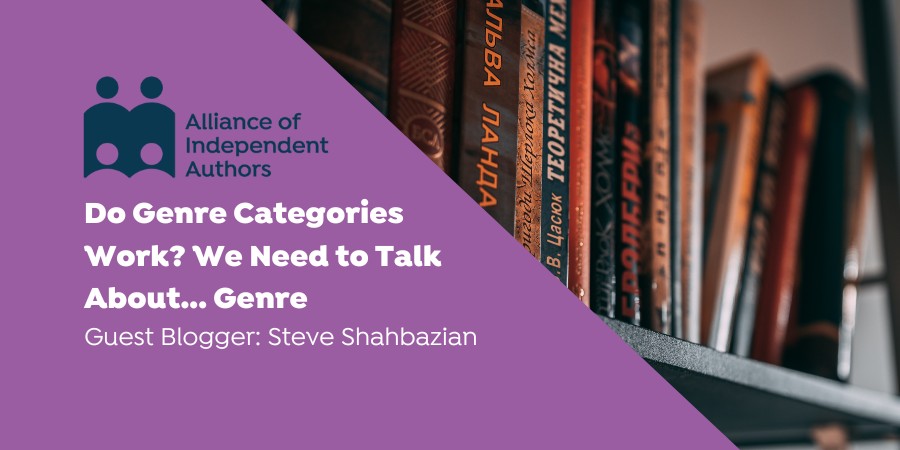
Steve Shahbazian
Every month our regular ‘We need to talk about…' item offers an ALLi member the chance to share their view for thought and discussion. This month, Alliance of Independent Authors member Steve Shahbazian has some questions to raise about genre categories. Have we got it right? Are they too restrictive? Steve shares his views to get us thinking…
How do we classify genre?
In “The Celestial Emporium of Benevolent Knowledge,” Jorge Luis Borges divided the animal kingdom into fourteen categories:
- those belonging to the Emperor
- embalmed ones
- trained ones
- suckling pigs
- mermaids
- fabled ones
- stray dogs
- those included in this classification
- those that tremble as if they were mad
- innumerable ones
- those drawn with a very fine camel-hair brush
- et cetera
- those that have just broken the vase
- those that from afar look like flies
If anything could summarise how I feel about genre categories, this is it.
Yet there it is, an inescapable aspect of how we authors present ourselves to readers.
One of the beauties of being an indie author – or, indeed, an author at all – is that we are free to write as the muse takes us. We have a blank page and can create anything our imagination allows. Yet, the moment it comes to share that with the rest of the world, we are confronted by the need to classify our work by genre.
And if our work does not fit neatly into this schema, then life suddenly becomes much more difficult.
Genre Muddles
Perhaps a little personal note is in order. I neither read nor write in any particular genre. I like literary fiction, I like science fiction, and I’m not at all averse to the odd thriller or mystery, either. As far as they tell a good story with engaging characters, I can enjoy them.
To put it another way, if I like an author or director, I’m not necessarily bothered what genre they work in. My favourite film director, for instance, is Stanley Kubrick. His films cover science fiction (2001: A Space Odyssey), dystopian (A Clockwork Orange), war (Paths of Glory, Full Metal Jacket), historical drama (Barry Lyndon), horror (The Shining) among others, yet they’re all recognisably Kubrick and all great (okay, I don’t actually like Eyes Wide Shut, but you get the point).
As a reader or writer, genre was not important. Until I got to self-publishing, I hardly gave the matter a second thought. The story always came first.
So when I heard the talk about genre, I felt lost. Yes, I could see the logic in writing in a specific genre and sticking to it, but it just wasn’t how I worked. Then, I recall hearing that readers stuck to their particular niche, which could be incredibly fine-grained. Well, I defer to the experts’ superior wisdom, but to me, it was like someone saying, “I only ever watch television shows featuring female billionaire Italian chef detectives with at least twelve murders and one near miss per episode. AND NOTHING ELSE!” I can’t say this is incorrect, only that it’s not something I’ve personally encountered.

Photo by Susan Q Yin on Unsplash
Format Fiction
Needless to say, I am not saying that authors who write in a specific genre are wrong. Obviously, any author needs to be clear about what they do and provide what their audience wants. That is basic common sense.
Whatever we write, readers need to know to expect. There are a certain expectations that come with particular types of book, and if readers don’t know what to expect, they are going to be confused. And if they don’t get what they expected, they will feel cheated.
However, I would argue this is not a matter of genre, but of format. Genre is the book’s general flavour; format its structural layout. For instance, the classic murder mystery contains a murder (obviously), a sleuth, a few red herrings and a denouement. Its exact flavour may vary – it may be gritty, cosy (cosy murder? Is that smothered to death with scented cushions?) or fantastical – but the underlying format is the same.
The Problem with Genre
The problem comes when the system of classification becomes inflexible. Then, it stifles innovation and restricts opportunities for readers and authors alike.
Now, the author seeking to market their work either has to limit what they do to fit in or somehow shoehorn it into existing categories – the equivalent of deciding whether our works are “those belonging to the Emperor,” or “those that from afar look like flies.” The result will be that new ideas are either killed off or consigned to the margins, where they can’t be seen.
Worse, it subordinates us as authors to the categories we work in. Imagine if Stanley Kubrick had to create a new identity whenever he made a new film – Stan K. for war films, S. Kubrick for sci-fi and so on – it would be ridiculous, so why should it be any different for authors? The main factor that determines whether readers buy a book is whether readers like the author. Genre should support this, not take precedent.
When a system forces authors to stick so rigidly to its categories that we have to subordinate our own identity, then it is a straitjacket – and who wants that?
The Opportunity for Indie Authors
Ultimately, genre is a guide to help us find what we are looking for. It is a contents page or index, and nothing more. It should respond to what authors and readers are doing, not limit what they can do. However, as long as it forces authors into rigid (and eccentric) categories, it will impose restrictions.
The rise of self-publishing provides the perfect opportunity for precisely this kind of creativity and we indies are doing just that. However, without a more effective way to guide readers, we will be stuck with the equivalent of “stray dogs” and “suckling pigs.”
More about today's member contributor
Steve Shahbazian describes himself as a supposedly accomplished author, who despite having written for over twenty years, has no clear idea what he is doing. He mostly writes in the “those that tremble as if they were mad” and “et cetera” categories… no wait! His latest novel is a future noir cyberpunk science fiction detective [actually, contract killer] thriller called Endgame. At least the title is straightforward….
Find Out More
 You can read up more about genres and tropes, with the ALLi Ultimate Guide to Comparison Authors, Genres and Tropes.
You can read up more about genres and tropes, with the ALLi Ultimate Guide to Comparison Authors, Genres and Tropes.
And catch up on the ALLi podcast exploring publishing across multiple genres, with Orna Ross and Joanna Penn: Publishing Across Multiple Genres Podcast.




